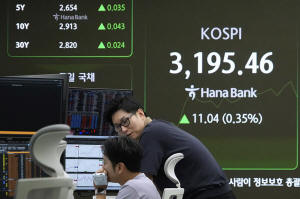World shares are higher after Wall Street steadies itself as Alphabet
rallies
[September 04, 2025] By
TERESA CEROJANO
MANILA, Philippines (AP) — World shares mostly traded higher Thursday
after a rally of technology stocks steadied Wall Street and a slide in
the dollar made Asian assets more attractive.
The future for the S&P 500 rose 0.1% while that for the Dow Jones
Industrial Average shed less than 0.1%.
In early European trading, Germany's DAX climbed 0.4% to 23,690.74 while
Britain's FTSE 100 added 0.1% to 9,187.40. In Paris, the CAC 40 slipped
0.2% to 7,703.00.
Japan's Nikkei 225 jumped 1.5% to 42,580.27 while Australia's S&P/ASX
200 added 1% to 8,826.50. South Korea's Kospi rose 0.5% to 3,200.83.
Taiwan's Taiex climbed 0.3% while India's BSE Sensex added 0.5%.
The Chinese markets bucked the trend, with Hong Kong's Hang Seng index
down 1.1% to 25,056.85. The Shanghai Composite index fell 1.3% to
3,765.88 on fears regulators will intervene amid excessive stock gains
and liquidity.
On Wednesday, Wall Street steadied after Alphabet and other technology
stocks rallied. It also got some relief from easing pressure from the
bond market, where the latest discouraging report on the U.S. job market
bolstered expectations that the Federal Reserve will cut interest rates
soon to support the economy.
The S&P 500 climbed 0.5% to break the two-day losing slide it had been
on since setting its latest all-time high. The Dow Jones Industrial
Average dipped 24 points, or 0.1%, and the Nasdaq composite climbed 1%.
Google’s parent company was one of the strongest forces lifting the
market and jumped 9.1% after avoiding some of the worst-case scenarios
in its antitrust case.

Also helping to steady Wall Street was a calming bond market. A day
earlier, yields climbed worldwide on worries about governments’
abilities to repay their growing mountains of debt, as well as concerns
that President Donald Trump’s pressure on the Federal Reserve to cut
short-term interest rates could lead to higher inflation in the long
term.
Such worries have pushed investors to demand higher yields before
lending money to governments. And when bonds are paying more in
interest, investors feel less need to pay high prices for stocks, which
are riskier investments.
[to top of second column] |

Currency traders work near a screen showing the Korea Composite
Stock Price Index (KOSPI) at the foreign exchange dealing room of
the Hana Bank headquarters in Seoul, South Korea, Thursday, Sept. 4,
2025. (AP Photo/Ahn Young-joon)
 On Wednesday, Treasury yields
retreated following the latest report on the U.S. job market to come
in weaker than expected. The 10-year Treasury yield fell to 4.22%
from 4.28% late Tuesday, for example.
The report showed that U.S. employers were advertising 7.2 million
job openings at the end of July, fewer than economists had forecast.
A weakened job market could push the Federal Reserve to cut its main
interest rate for the first time this year at its meeting later this
month. That’s the widespread expectation among traders, with the
next big data point coming on Friday via an update on U.S. hiring
during August.
Lower interest rates could give the job market and overall economy a
boost. The downside is that they can also push inflation higher when
Trump’s tariffs may be set to raise prices for all kinds of imports.
“The dollar, naturally, buckled under the weight of weaker jobs and
lower rates, and increased Fed cut bets, handing Asia an early
boost. When the U.S. dollar slides, Asian assets instantly look more
attractive in currency-adjusted terms, and regional equities should
snap to life after a sluggish start to September,” Stephen Innes of
SPI Asset Management said in a commentary.
But he said Chinese equities slid as regulators fret over excessive
stock gains and too much liquidity in the system, with Beijing
signaling it may tighten the screws.
In other dealings on Thursday, U.S. benchmark crude lost 35 cents to
$63.62 per barrel. Brent crude, the international standard, shed 35
cents to $67.25 per barrel.
The U.S. dollar rose to 148.09 Japanese yen, from 148.05 yen. The
euro fell to $1.1659 from $1.1667.
All contents © copyright 2025 Associated Press. All rights reserved |